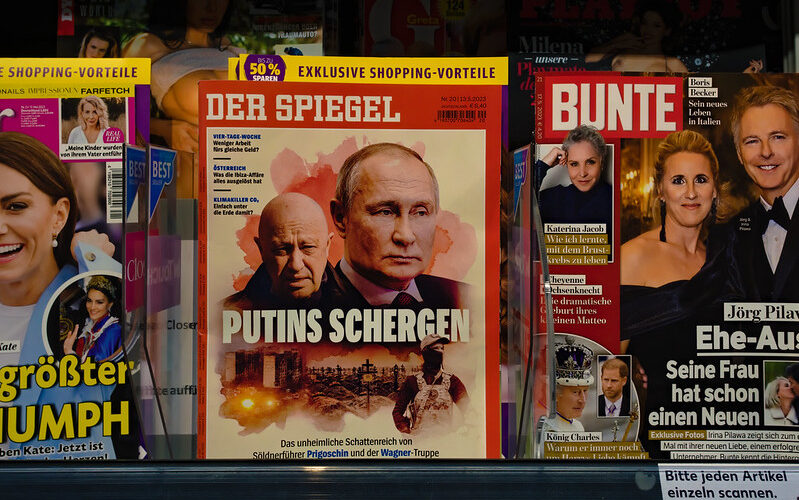Vladimir Putin is undoubtedly one of the weakest leaders Russia has ever had. Although he may have succeeded in preserving formal power following the mutiny by Wagner group leader Yevgeny Prigozhin, it is questionable if, in the long-term, he will manage to continue playing the role of a manager who has been relatively successfully balancing the interests of various oligarchic groups for decades.
Putin is not a “mighty Russian tsar”, despite widespread beliefs that he is. Ever since he came to power in 1999, he has repeatedly demonstrated serious weakness, especially in the global arena where Russia has become an object of ridicule. The Russian President is known for his empty threats, which very few people take seriously now.
Quite aware that Putin has no real power in Russia, months ago Prigozhin started a confrontation with the country’s top military officials – Defense Minister Sergei Shoigu, and Chief of the General Staff Valery Gerasimov. The escalation of their feud was a matter of time. Finally, on June 24, the Wagner Group frontman launched a “march for justice”, allegedly aiming to “prevent the destruction of his private military company”, and to “bring to justice those who, through their unprofessional actions, made a huge number of mistakes during the special military operation”.
Since the Wagner mercenaries easily captured Russia’s city of Rostov-on-Don (where many locals greeted its soldiers as liberators), bypassed Voronezh and Lipetsk, and got to within 200 kilometers of Moscow, Prigozhin had a unique opportunity to overthrown Putin and his regime. Even though the Russian leader claims that “an armed mutiny would have been suppressed in any event”, it is improbable that the Russian forces would really have attempted to prevent the Wagner units from entering Moscow.
The fact that the vast majority of pro-Kremlin propagandists were silent during Prigozhin’s mutiny clearly indicates that they were waiting to see the outcome of the crisis, to simply join the winner. Many Russian top officials adopted the same strategy, trying to stay out of the conflict. Thus, there is no guarantee that the Wagner Group would have encountered a serious resistance if it had wanted to capture the Kremlin.
Prigozhin, however, claims that he never had such plans. His forces reportedly “went to demonstrate their protest, and not to overthrow the government in the country”. Whatever his ambitious were, the Wagner Group frontman was not willing to “fight until victory”. That is one thing he has in common with Putin. Neither figure seems ready to “go all the way”. Indeed, when it comes to the Russian Federation, it is all about behind-the-scenes deals.
Putin and Prigozhin have reportedly reached an agreement – brokered by Belarusian President Alexander Lukashenko – that has ended the crisis. At least for now. However, it remains unclear what exactly the Russian President has promised to his former ally. But the fact that the Kremlin spokesperson Dmitry Peskov said that all charges against Prigozhin and the Wagner Group members will be dropped – even though Putin previously accused Prigozhin of “treason” – perfectly illustrates Putin’s weakness.
In an attempt to create an illusion that he is firmly in control of the situation, Russia’s President emphasized on June 26 that organizers of the march on Moscow would be “brought to justice”. Since Putin has a history of empty promises, his statement should not be taken seriously. Wagner, according to reports, continues working in Russia and recruiting new fighters. Moreover, it is highly uncertain if the group’s leaders will agree to subordinate themselves to Shoigu – possibly the most incompetent Russian Defense Minister ever.
On the other hand, now that Putin has managed to consolidate his formal power, he has got significant leverage over Prigozhin. Thus, sooner or later, the Wagner Group frontman may fall out of a window, which is how several people who had close ties with Kremlin ended up over the past year and a half. But even if that happens, that does not mean that Putin, Shoigu and Gerasimov will continue doing business as usual.
Russia’s leader will be under pressure to fire the two top military officials – something that he seeks to avoid at any cost. The very structure of the Kremlin is similar to the Mafia, which means that if Putin fires Shoigu or any other minister, Russia’s powerful oligarchs will feel that they could be next to fall from grace with the “tsar”.
Therefore, in order to preserve their privileges, they may soon start looking for a new figure who can eventually replace Putin.
But for now, Putin will continue playing the role of a “mighty leader”, and his propagandists will be louder than ever. For the oligarchy that rules Russia, it is extremely important to preserve the illusion of stability in the country, even though the Russian Federation – unable to protect its own territory, and prevent 25,000 mercenaries from reaching Moscow – is a living corpse. For the West, preserving Putin and his gang of oligarchs in power is also of crucial importance. As long as charlatans like Putin, Shoigu, Gerasimov, and many other Russian officials and oligarchs, pull the strings in the Kremlin, Moscow will have zero chance to win the war in Ukraine.
And it is the outcome of the conflict in the Eastern European country that will have a very strong impact on Putin’s reign of terror. He may have survived Prigozhin’s mutiny, but it is doubtful whether his hybrid regime will survive the war he started in Ukraine.
Image: 7C0

